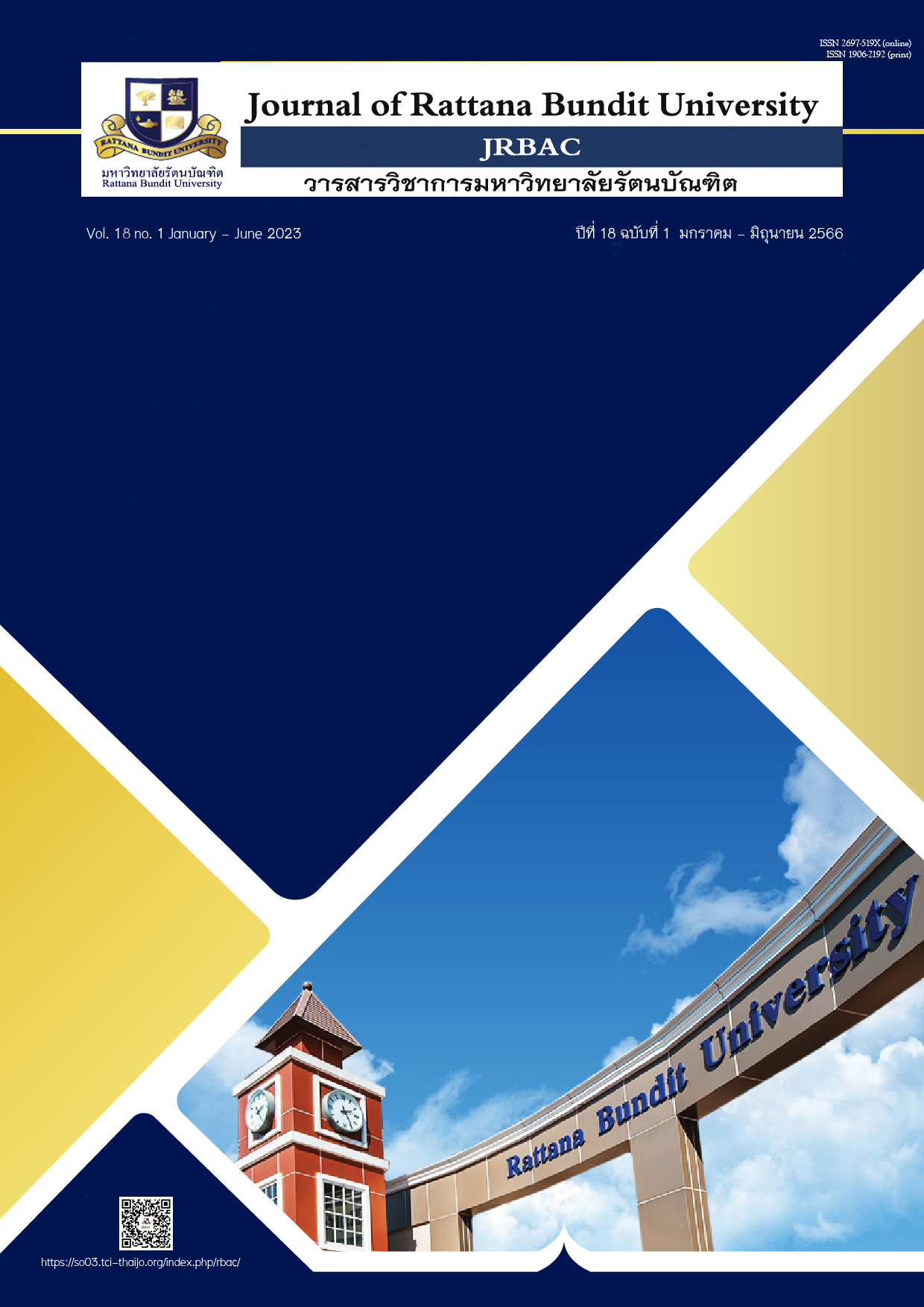Organizational Development Factors According to Government Management Criteria and Performance of District Offices in Bangkok Case Study Bangkapi District Office
Main Article Content
Abstract
The purposes of this article were to study 1) the levels of organizational development factors in public administration and operational efficiency of Bangkapi District Office, and 2) the organizational development factors in accordance with public administration affecting efficiency in operations of Bangkapi District Office. The study was conducted by using quantitative research. The population was comprised of personnel of Bangkapi District Office. The amount of sample gained by stratified sampling was 111. The research instrument was questionnaires. Data were analyzed by using descriptive statistics including percentage, arithmetic mean, standard deviation and inferential statistics, multiple correlation analysis and applying principles of stepwise multiple regression analysis. The results revealed that 1) organizational developments in accordance with public administration for the skills aspect had the highest mean and management behavior had the lowest mean, efficiency in operations for the work quality revealed the highest mean, and the expenses had the lowest mean, and 2) organizational development factors in accordance with the criteria of public administration positively affected the efficiency in operations of Bangkapi District Office, which is used to create a framework for development to achieve excellence, including share value, skills and working system.
Article Details

This work is licensed under a Creative Commons Attribution-NonCommercial-NoDerivatives 4.0 International License.
References
กัลยารัตน์ ธีระธนชัยกุล. (2562). พฤติกรรมองค์การและการพัฒนาองค์การ. วี.พริ้นท์ (1991).
กุณภาณัฏฐ์ สุวรรณนุรักษ์ อรุณ ไชยนิตย์ และ ภานุพงศ์ สามารถ. (2563). รูปแบบการพัฒนาประสิทธิภาพองค์การ กรณีศึกษา: สำนักมาตรฐานและประเมินผลอุดมศึกษา. วารสารมหาจุฬานาครทรรศน์, 7(11), 159-162.
ณัฏฐพันธ์ เขจรนันทร์. (2560). พฤติกรรมองค์การ. ซีเอ็ดยูเคชั่น.
ธนวรรธร์ สุรมรรคา. (2563). ปัจจัยที่มีผลต่อความสำเร็จในการบริหารจัดการภาครัฐแนวใหม่ กรณีศึกษา สำนักงานปลัดกระทรวงอุตสาหกรรม. http://www3.ru.ac.th/mpa-abstract/files/2563_1629861152_6214832034.pdf
นพปฎล สุนทรนนท์, (2560). การบริหารภาครัฐไทย. พริกหวาน.
นันทนา ละม่อม และ พีชญาดา พื้นผา. (2561). การศึกษาประสิทธิภาพในการปฏิบัติงาน ปัจจัยภายในองค์การที่มีผลต่อความสุขในการทำงานระหว่างพนักงานเทศบาลและพนักงานจ้างของเทศบาลตำบลในจังหวัดอุบลราชธานี. วารสารพัฒนบริหารศาสตร์, 58(4), 13.
นุกูล ชูทอง และ ชัชวาล อรวงศ์ศุภทัต. (2559). ประสิทธิผลองค์การ. ไอดี ออล พรินท์.
เนตร์พัณณา ยาวิราช. (2565). การพัฒนาองค์การและการจัดการนวัตกรรม. ทริปเพิ่ล กรุ๊ป จำกัด.
ศิริรัตน์ ชุณหคล้าย. (2558). การบริหารจัดการองค์การตามทฤษฎีรัฐประศาสนศาสตร์. สำนักพิมพ์แห่งจุฬาลงกรณ์มหาวิทยาลัย.
สุรศักดิ์ ชะมารัมย์. (2562). ประเด็นร่วมสมัยทางนโยบายสาธารณะและการจัดการภาครัฐ. โฟเพซ.
Barbosa, E. (2014). Organizational culture oriented for innovation: Influencing variables. The Matopolska School of Economics in Tarnow Research Papers Collection, 25(2), 37-45.
Bennis, W. G. (1969). Organization development: Its nature, origins and prospects. Addison-Wesley.
Burke, W. W. (2002). Organization change, Theory and practice. SAGE.
Burke, W. W., & Schmidt, W. H. (1971). Management and organization development. Personnel Administration, 34(2), 44-56.
Certo, S. C. (2000). Modern management (8th ed.). Prentice Hall.
Chamaram, S. (2019). Contemporary issues in public policy and government management. Forepace. (in Thai)
Choothong, N., & Orawongsuphathat, C. (2016). Organizational effectiveness: Concept and research literatures. ID All Print. (in Thai)
Chunhakhlai, S. (2015). Organizational management according to public administration theory. Chulalongkorn University Printing House. (in Thai)
Daft, R. L. (2012). New era of management. Cengage Learning.
Hamel, G. (2007). The future of management. Harvard Business School.
Hammer, M., & Champy, J. (1993). Reengineering the corporation: A manifesto for business revolution. Harper Business.
Ivancevich, J. M. (2008). Human resource management (10th ed.). McGraw-Hill.
Katz, D., & Kahn, R. L. (1978). The social psychology of organization (3rd ed.). Wiley & Sons.
Ketchonan, N. (2017). Organizational behavior. Se-Education. (in Thai)
Lamom, N. & Tuanpha, P. (2018). Performance study organizational factors affecting happiness at work between municipal employees and employees of sub-district municipality in Ubon Ratchathani province. NIDA Development Journal, 58(4), 13. (in Thai)
Lawler. E. E. (2005). Creating high performance organization. Asia Pacific Journal of Human Resource, 43(1). https://journals.sagepub.com/doi/abs/10.1177/1038411105050304
Owen, R. G. (2001). Organizational behavior in education: Instructional leadership and school reform (4th ed.). Allyn and Bacon.
Peters, & Waterman, R.Jr. (1982). In search of excellence. Business Horizons, 23(3), 14-26.
Peterson, C., & Plowman, E. (1989). Business organization and management. Irwin.
Soonthornnon, N. (2017). Thai government administration. Prikwarn Graphic. (in Thai)
Suramakha, T. (2020). Factors affecting success in new government management: Case study, Office of Permanent Secretary (Master of thesis). http://www3.ru.ac.th/mpa-abstract/files/2563_1629861152_6214832034.pdf (in Thai)
Suwannurak, K., Chaiyanit, A., & Samart, P. (2020). Organizational efficiency development model: Case study Bureau of Higher Education Standards and Evaluation, Office of the Higher Education Commission, Bangkok. Journal of MCU Nakhondhat, 7(11), 159-162. (in Thai)
Thirathanachaikul, K. (2019). Organizational behavior and organizational development. V Print (1991). (in Thai)
Waterman, J. R., Thomas, J., Peters, & Julien R. P. (1980). Structure is not organization. Business Horizons, 23(3), 14-26.
Worley, C., & Feyerherm, A. (2003). Reflections on the future of organization development. Journal of Applied Behavioral Science, 39, 97-115.
Yawirat, N. (2022). Organization development and innovation management. Triple-Group. (in Thai)
Xinzhu, L. & Anne, M. (2007). Public ends, private means: Strategic purchasing of health services. World Bank.
Zha, H. (2006). Interactive Technologies and Sociotechnical Systems (12th ed.). International Conference, VSMM 2006, Xi'an, China, October 18-20, Proceedings.


